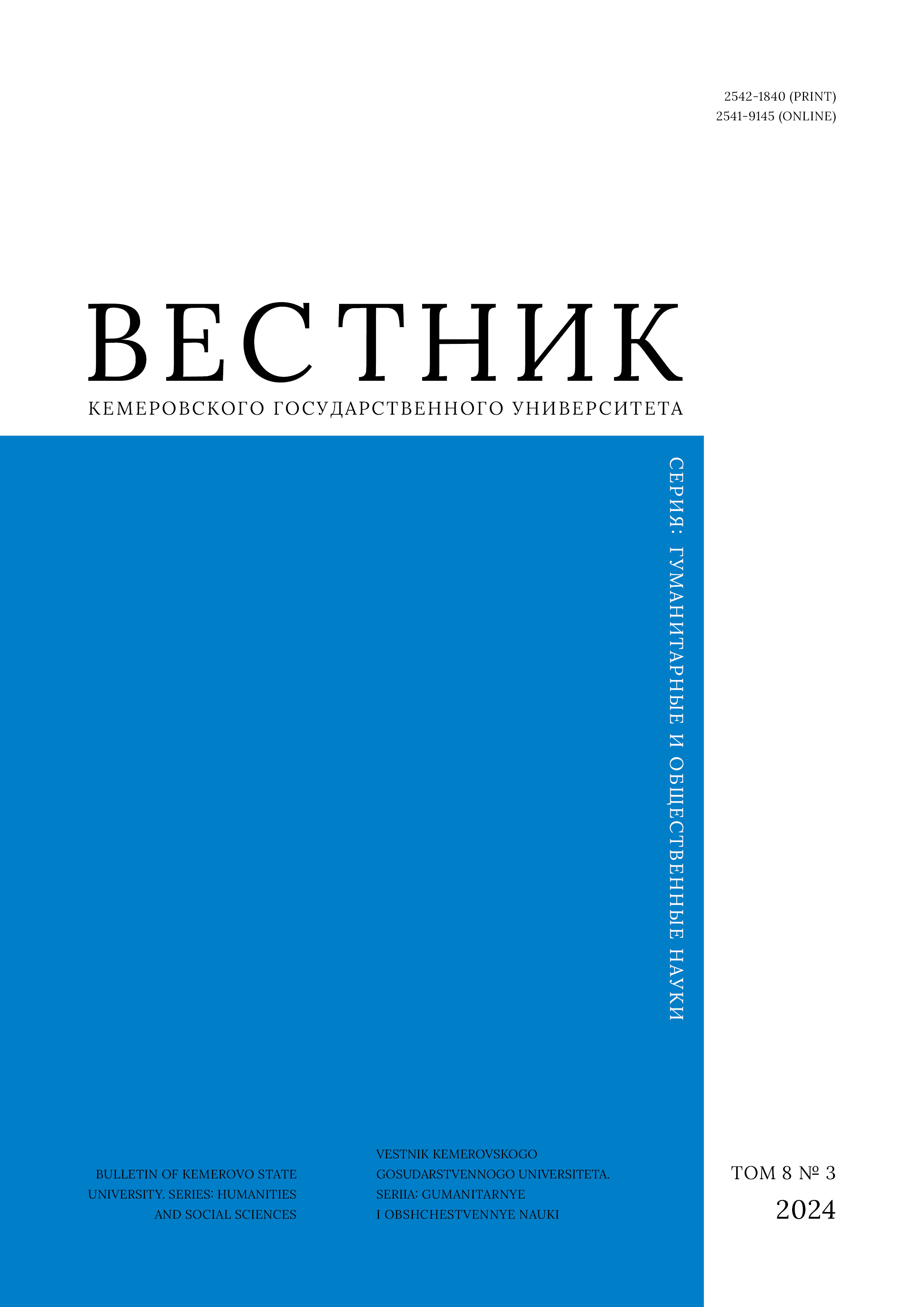N. F. Katanov Khakass State University
Kyzyl, Russian Federation
The article describes the predominant type of dysgraphia in primary-school students that live and study in a bicultural and bilingual environment of the Republic of Tuva, Russia. The research revealed the effect of social factors on the development of written expression as a manifestation of a higher mental function, i.e., speech. Domestic social psychology pays little scientific attention to speech formation in the conditions of natural bilingualism, which gives relevance and novelty to this neuropsychological research. Its objective was to identify the leading type of dysgraphia in primary-school children and subject it to quantitative and qualitative analyses. The author counted dysgraphic errors in a text written by primary-school students and used the neuropsychological approach to classify them. Acoustic-kinesthetic (phonemic) dysgraphia proved to be the most frequent type of dysgraphia. It was caused by Tuvan pronunciation and spelling peculiarities, which proved that the bilingual Tuvan-Russian environment affects written speech of primary-school students.
neuropsychology, letters, writing disorders, dysgraphia, neuropsychological approach, primary-school students, Republic of Tuva
1. Kotova S. A., Nicanorova A. A. First form pupils` graphic skills as a basis for sustainable development in education. Gertsenovskie chteniia. Nachalnoe obrazovanie, 2011, 2(2): 134–140. (In Russ.) https://www.elibrary.ru/oitxkz
2. Shabalina E. S. Teaching writing to younger schoolchildren in the context of the Federal State Educational Standard of Higher Education. Alphabet of an educational environment, 2017, (1): 45–46. (In Russ.) https://www.elibrary.ru/ytkygf
3. Mamyga K. A. Formation of self-control of writing in younger schoolchildren. Alphabet of an educational environment, 2024, (1-2): 260–268. (In Russ.) https://www.elibrary.ru/rpypmh
4. Scliar C. L. How to learn early literacy in reading and writing. Vestnik Kazakhskogo natsionalnogo pedagogicheskogo universiteta imeni Abaia. Seriia: Filologicheskie nauki, 2023, 85(3). (In Russ.) https://doi.org/10.51889/2959-5657.2023.85.3.012
5. Tsgoyeva A. K., Konopatskaya L. L. Violations of writing and their correction in younger schoolchildren with bilingualism. Advances in current natural sciences, 2008, (6): 122–123. (In Russ.) https://www.elibrary.ru/jkevyl
6. Glagoleva E. A. Reading and writing disorders or low level of linguistic abilities? Sborniki konferentsii NITS SOTSIOSFERA, 2014, (23): 39–43. (In Russ.) https://www.elibrary.ru/qjkzvm
7. Kovylyaeva T. Yu., Tenkacheva T. R. Impaired sound pronunciation and writing in younger schoolchildren with general speech underdevelopment. The study and education of children with various forms of dysontogenesis, eds. Filatova I. A., Nugaeva O. G. Ekaterinburg: UrSPU, 2009, 144–145. (In Russ.) https://www.elibrary.ru/visiyf
8. Shcherba L. V. Language system and speech activity. Leningrad: Nauka, 1974, 428. (In Russ.)
9. Potebnya A. A. Thought and language. Kiev: SHINTO, 1993, 192. (In Russ.)
10. Vygotsky L. S. Thinking and speech. Moscow: AST, 2023, 576. (In Russ.)
11. Leontiev A. A. Language, speech, speech activity. Moscow: LENAND, 2019, 216. (In Russ.)
12. Luria A. R. Fundamentals of neuropsychology. Moscow: Akademiia, 2006, 384. (In Russ.)
13. Mikadze Yu. V. Neuropsychology of childhood. St. Petersburg: Piter, 2021, 288. (In Russ.)
14. Akhutina T. V. Violations of writing: Diagnosis and correction. Actual problems of speech therapy practice, ed. Khrakovskaya M. G. St. Petersburg: Aktsioner i K, 2004, 78–85 (In Russ.)
15. Akhutina T. V. Neuropsychological approach to diagnosis and correction of difficulties in teaching writing. Modern approaches to diagnosis and correction of speech disorders, ed. Khrakovskaya M. G. St. Petersburg: St. Petersburg University Press, 2001, 195–211. (In Russ.)
16. Inshakova O. B. Neuropsychological diagnostics: Testing writing and reading skills in younger schoolchildren. Moscow: Sekachev, 2017, 132. (In Russ.)
17. Kameneva V. A. Social order and language. Nationality as a target of ideological technologies. Tomsk State Pedagogical University Bulletin, 2006, (4): 118–124. (In Russ.) https://www.elibrary.ru/kkpqwl
18. Vorkachev S. G. Contemporary Russian anthropological linguistic: Its cultural concept, its problems and the vector of its development. Bulletin of the Russian academy of Sciences: Studies in language and literature, 2011, 70(5): 64–74. (In Russ.) https://www.elibrary.ru/oiyetf
19. Kameneva V. A., Morozova I. S., Rabkina N. V., Kartavtseva A. P. Ethnic stereotypes in the linguistic consciousness: A case study of short teenagers from a boarding school in Kemerovo region. Society: Sociology, pedagogy, psychology, 2022, (1): 111–117. (In Russ.) https://doi.org/10.24158/spp.2022.1.13
20. Kameneva V. A., Kartavtseva A. P., Kolomiets S. V., Morozova I. S. The image of the motherland in the language consciousness of school-age Shorians of Kuzbass (on the example of the associative fields "Homeland" and "Mountain Shoria"). Tomsk State University Journal of Philology, 2023, (83): 51–66. (In Russ.) https://doi.org/10.17223/19986645/83/3
21. Litskevich E. Yu. The state of the socio-bilingual environment in the Republic of Tyva. Psychology. Historical-critical reviews and curren researches, 2022, 11(6-1): 207–214. (In Russ.) https://doi.org/10.34670/AR.2023.56.82.023
22. Narykova V. S. Propaedeutics of writing disorders: Preventing and correcting dysgraphia and dysorthography in primary-school students at a speech therapy center. Psikhologiia i pedagogika: Metodika i problemy prakticheskogo primeneniia, 2010, (13): 87–92. (In Russ.) https://www.elibrary.ru/rusisn
23. Lalaeva R. I. Elimination of optical dyslexia and dysgraphia. In: Lalaeva R. I. Speech therapy in correctional classes. Moscow: Vlados, 1998, 286–301. (In Russ.)
24. Sadovnikova I. N. Violations of written speech and their overcoming in younger schoolchildren. Moscow: Vlados, 1995, 255. (In Russ.)
25. Artemyeva N. Yu. Preventing and correcting mixed dysgraphia in primary-school children. Special education: Proc. XI Intern. Sci. Conf., St. Petersburg, 22–23 Apr 2015. St. Petersburg: LSU, 2015, 46–50. (In Russ.)
26. Kameneva V. A., Morozova I. S., Rabkina N. V., Kolomiets S. V. Psycholinguistic description of the meanings of the neologisms Cyberbullying and cyberbully: Semantics awareness. Political linguistics, 2021, (6): 146–155. (In Russ.) https://doi.org/10.26170/1999-2629_2021_06_16
27. Chypsymaa O. O. Tuvan-Russian bilingualism: Pragmatics of prohibition in family communication. Relevant issues of ethnoecological and ethnocultural studies of Sayano-Altaians: Proc. VI Intern. Sci.-Prac. Conf., Kyzyl, 30 Jun – 3 Jul 2020. Kyzyl: TuvSU, 2020, 60–61. (In Russ.) https://www.elibrary.ru/gpdcxl
28. Vorkachev S. G. The word "Homeland" in Russian linguistic culture. The image of Motherland: Content, formation, andupdating: Proc. Conf., Moscow, 20 Apr 2018. Moscow: MHPI, 2018, 42–47. (In Russ.)
29. Vorkachev S. G. Ethnic mentality in language: "Russian happiness". Current issues in philology and pedagogical linguistics, 2012, (14): 77–84. (In Russ.) https://www.elibrary.ru/pqgall


















